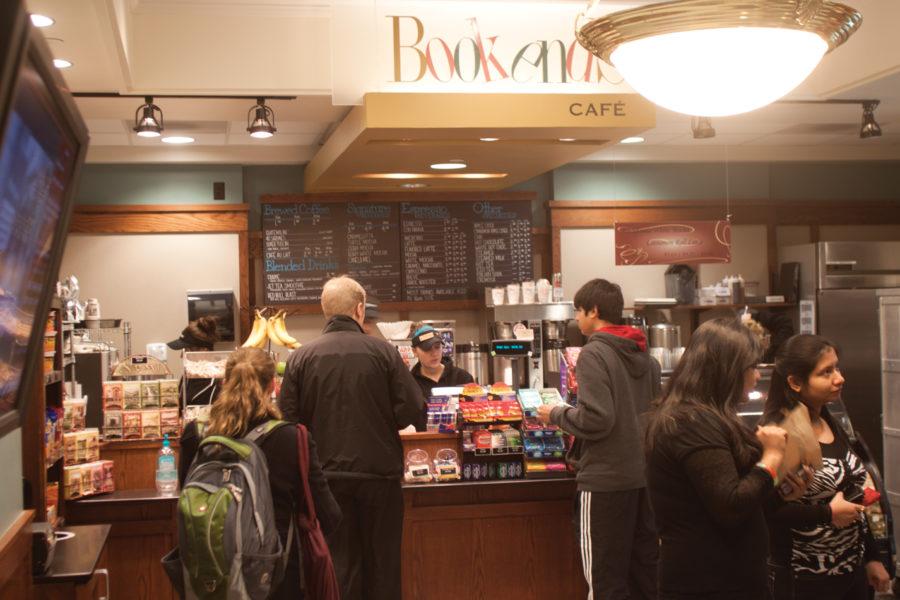Campus cafes work toward sustainability
Photo: Jacob Balough/Iowa State Daily
Sarah Lokenvitz, center, sophomore in integrated studio arts, takes orders Feb. 27, at Bookends Cafe in Parks Library. Cafes such as Bookends serve customers in an eco-friendly manner by using recyclable containers and donating leftover food to Food at First, a local food bank.
February 26, 2011
A variety of green initiatives are implemented when students come to purchase lunch, a snack or their morning coffee at their cafe of choice.
Kristi Patel, assistant director of retail operations, lists several initiatives, including the 35-cent discount for students who bring their own tumbler.
“[The 35-cent discount] didn’t really catch on until last April, where we really did a big marketing push,” Patel said.
“We looked to figure out how many coffee cups we were buying over a year’s time, and it was almost half a million cups, and to us that was a big ‘Wow, we need to use this information to market to our customers that these are all the cups that are going to the landfill,’ and if you bring in your own tumbler, you’re preventing one extra cup from the landfill, you’re saving money and you’re also being more green.”
If students don’t bring their own tumblers, cafes like the one located at Hawthorn serve coffee to students in cups made of 10 percent recycled materials, and the sleeves are made from 60 percent of recycled materials.
When it comes to recycled materials, Caribou Coffee uses 100 percent-recyclable coffee sleeves. The cafe is also trying to cut down on the overall use of the sleeves, leaving the cooler caffeinated beverages sleeveless.
“We have also started not putting a sleeve on every drink; the drinks that are made in the espresso bar are not as hot as the drinks that would come out of the coffee brewer,” said Angela Witt, manager of dining services for the Hub and Caribou.
“We started putting a basket of sleeves on the counter so if people wanted a sleeve, they can take one, hoping to reduce our overall usage of that product in general, and it’s also promoting people to purchase a reusable sleeve or use a tumbler and reduce the amount of cups in general.”
Caribou strives to reduce the overall use of coffee sleeves, but the cafe is also driven to get all their coffee certified by the Rainforest Alliance by the end of 2011.
“Right now [our Caribou has] over 85 percent [of the coffee] certified; 100 percent of the espresso is already certified,” Witt said.
The Rainforest Alliance is a program committed to sustainability, dedicated not only to the environment but to the workers providing the beans as well.
“Not only does it ensure that the coffee is produced in a sustainable way and the environment is protected; they ensure that their workers have access to clean water, nice living conditions, a decent wage and their children have access to education,” Witt said. “It’s a well-rounded program that addresses all those needs.”
While Caribou Coffee incorporates Rainforest Alliance certified coffee, several cafes on campus are involved in another green initiative, Food at First.
Cafes such as Bookends, Courtyard, HUB, MU and Hawthorn are all actively engaged with the program.
“There’s a church in Ames where they come out to our facilities,” Patel said. “[The church has] a program where their volunteers come to our facilities and pick up [food] and take it back to this program.”
Grounds for the Gardens is a program promoted preferably around Earth week, for students who are in the gardening mood. Cafes will save coffee grounds, giving the grounds to students to put back into the soils.
Another focus that has all cafes on campus involved is the idea of implementing more compostable and recyclable materials.
“You’ll notice that it’s kind of a struggle; Ames burns our trash, and we don’t have a program currently in retail to compost our post-consumer trash,” Patel said. “The focus that we have decided to take from a retail perspective on disposables is to try to purchase products that are made more environmentally friendly.”
Currently there are some products on campus that are compostable, such as some of the silverware, fruit cups and cold beverage cups.
Witt is also focused on implementing more recyclable, compostable materials, particularly with packaging.
“We’ve also been trying to reduce the use of certain materials in our packaging. We have the compostable forks, spoons and knives, and any of the papers that we use, we got away from any sort of wax coating on those papers by just using a plain brown paper for a pastry bag or to wrap the subs in,” Patel said. “We are always on the search for products that we can use that reduce the carbon footprint and have more recycled materials or sustainable practices that go into their production.”
At Hawthorn, a new recycling program will start to help the employees monitor how much recyclables are used when preparing and serving food for the students.
“We are always looking for new ways to be more sustainable,” said Tatiana Twedt, manager of the Hawthorn Cafe.
Hawthorn currently recycles cardboard boxes along with plastic bottles; the cafe hopes to use more base compostable materials in their packaging.
“It’s this fine line between if we’re not composting them, it’s going into the trash, it’s being burned to produce energy,” Patel said.
As students continue to dine at Iowa State, the cafes will continue to improve themselves, with intentions to serve students more sustainably.

















